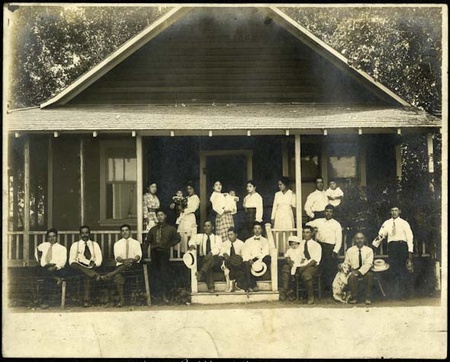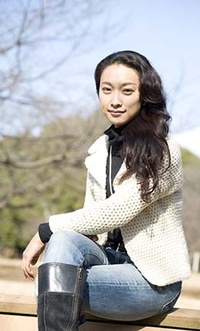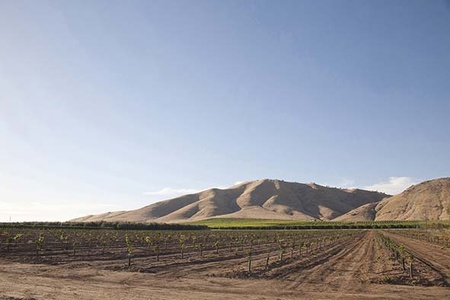An opportunity to reflect on my family history
After working at an advertising firm in Japan, Misaki Matsui headed to America on her own. Now she is an up-and-coming photographer in the greater New York area. While she was born and raised in Japan, it wasn’t until Misaki took a visit back to Japan that she would find out a little known fact about her family history—her great-grandfather had once lived in California and managed a vineyard in the 1910s and 1920s, and her grandfather had taken photographs of his experience. After this discovery, she set out on her own mission to uncover this untold chapter of her family history.
In anticipation of her upcoming public program on July 20, 2013 at the Japanese American National Museum, “Back to California after 100 years,” I had an opportunity to interview Misaki about the details of her investigation of her roots, as well as about her feelings before and after finding out about this piece of her family history. (Interviewer: Keiko Fukuda)

A photo kept by Misaki’s grandfather, Takaji Matsui. Taken at Rayo (Visalia, CA) where her great-grandfather managed a vineyard. (Photographer is unknown. Photo courtesy of Misaki Matsui)
* * *
Q: How did you find out that your grandfather and great-grandfather had lived in California?
Matsui (hereafter, “M”): I had never spoken to my grandfather about America, so it was long after he had passed away in 1999 that I learned that he and my great-grandfather had moved from Suo Oshima, Yamaguchi prefecture, to California in the 1910s and 1920s. Eventually they moved back to Japan, so I was born and raised in Japan.
A year and a half after I had moved to the States, I went back to Suo Oshima to pay my respects at the family grave for the first time in a long time. It was there that my uncle revealed to me for the first time that my grandfather had lived in America and used to play the violin and was into photography. I was so surprised, especially because I had also been doing both without ever knowing about my grandfather.
After the visit, I immediately began to search through the storage room at my parents’ home in Kobe. From the back of the closet appeared my grandfather’s old black photo album, wrapped in plastic. As I looked through several sepia-toned and black and white photos of America back then, I was so moved that it rendered me speechless. It was a moment that made me feel as if I were an explorer who had discovered a treasure inside a cave, deep in the forest.
Q: What inspired you to go to America?
M: 2007 was a turning point for me. I really started thinking about my life—about what I really wanted to do—and ultimately I decided that I wanted to pursue photography and to live in New York. I’d never been to America and didn’t know anybody in New York, but I also wasn’t afraid to go. My decision to move to America was unrelated to my grandfather’s time in America, but hearing about his story after the fact, I guess it was just in my blood, in my DNA, to be doing this.
Viewing the same scenery across time
Q: Did you feel any hesitation about going to see the land in which your ancestors lived? How long did it take you to figure out where it was located?
M: The fact that I happened to be the only one in the Matsui family that lives in America, and having the same two interests as my grandfather in photography and the violin, I felt a sense of destiny. I strongly felt a sense of “responsibility” to find out more about my ancestors, to visit the place that they lived and to take photos of it, and to compile my discoveries to show to my relatives.
I began my research with the stories and memories told by my uncle; the letters that my grandfather wrote to his children; the memos written on the edges of pictures form the album; using my great-grandfather’s date of birth that I found from the family registry as a reference point. I contacted the Japanese Overseas Migration Museum in Yokohama, as well as the Japanese American National Museum in Los Angeles, and I was able to obtain documents such as boarding lists, business owner records, and Census Data. I found out that my great-grandfather had been a chef, and later managed a vineyard. I used Google Maps to search for the vineyard and the elementary school that my grandfather had attended.
I wanted to go to California as a photographer, so I applied for an Artist In Residence position at Kala Art Institute in Berkeley. I was accepted. From May 2011, I lived in Oakland for one month. After further research in San Francisco, I set out on a 2-day, 1-night journey to the land my ancestors lived in, and shot photos. After that, I put together a photo book including my grandfather’s documents and pictures from the past and present. My relatives were very happy and thankful for the research that I had done. In 2013, from March to May at the JICA (Japan International Cooperation Agency) Japanese Overseas Migration Museum in Yokohama, I opened a photo exhibition titled “Back to California after 100 years—following in the footsteps of my ancestors.“ It took me about three and a half years from the time I first heard about their story to the opening of the photo exhibition.
Q: What kind of impression did you get after actually visiting the area? Did you actually get the feeling that this place was part of your roots?
M: I went to Visalia where my great-grandfather managed the Rayo Vineyard. And I also went to Bakersfield, which was where my great grandfather worked as a chef for an oil company, and my grandfather attended elementary school.
At times I felt uneasy and lonely while driving—on the left hand side, which I am not used to—for hours through the vast California landscape; but when I finally arrived at the vineyard, I was moved to tears. The current landscape probably hasn’t changed much from a century ago, and it dawned on me that I was seeing the same scenery across time, just as my ancestors had seen. My respect for them grew, considering that they crossed the sea from a small island to a large continent, started from nothing, and worked their way up to ultimately manage a vineyard. At the same time, it also gave me encouragement: I, too, had started from zero in America, without any prior education in art or experience as a professional photographer, so maybe I can make my dreams come true here in America as well, one step at a time. While watching the pink sky at sunset, it was as if I were having a conversation with my great-grandfather whom I never met, and my grandfather who had never before spoken about his time in America.
My ancestors’ earnest way of life
Q: What kind of effect did finding out about your ancestors’ lives in America have on you, personally and professionally? Please tell us about any changes to your mindset or how you perceive your own identity.
M: My great-grandfather and grandfather moved from Japan to America for “dekasegi” because the Matsui family was bankrupt. After managing the vineyard, they were forced to return when my great-grandfather became ill. My grandfather tried to return to America later, but he was unable to do so due to opposition from his family. Because he did not have a college degree, although he became a teacher in Japan, he wasn’t able to earn much of an income. In order to support his family, he then decided to move his whole family to Korea for the next 12 years. It’s amazing that he was able to move to two different overseas countries for over 10 years each, during a time without any Internet or airplanes. Despite repeatedly facing adversity, my ancestors never gave in—adjusting to the times with flexibility, changing jobs, and living life with patience, strength, and perseverance. I respect their way of life from the bottom of my heart. If I were in their position, I’m not sure if I would have been able to do as they did—I may have given up somewhere along the way. I am truly moved and grateful to know that I am alive here today because of the way they lived so earnestly back then. Thinking about everything that my ancestors endured, I feel like there’s no way I can make any excuses about my life in New York.
Q: To wrap things up, please leave us with a message for those who will be joining the event in Los Angeles in July.
M: I hope everyone can think about not only your own roots, but also about your family. By talking to your family and relatives, I hope that you can make the realization—not only in your minds, but in your hearts—that you are alive today thanks to the connection from past to present.
Also, there are a lot of Japanese people who have buried the difficult experiences that they encountered during the war, not telling any of those stories to their grandchildren or great-grandchildren. So by telling the story of how desperately and earnestly they lived—about their great efforts and their “way of life” back then—and if in turn, we as the current young generation pays respect to their experiences, perhaps we can raise our Japanese spirituality together. Although the stresses we face today are different from that of the past generations, there are certainly things that we can relate to and learn from each other. Japanese people have a tendency to be overly modest, but now is the time for us to embrace the virtues of the Japanese spirit and culture. I hope we can start a transition from the “aesthetics of the untold” to a new phase that encourages “enhancement via communication”.
Website: www.misakimatsui.com “no moment without hope”
* * *
Back to California after 100 Years with Misaki Matsui
Saturday, July 20, 2013 • 2PM
Japanese American National Museum
Los Angeles, California
© 2013 Keiko Fukuda







